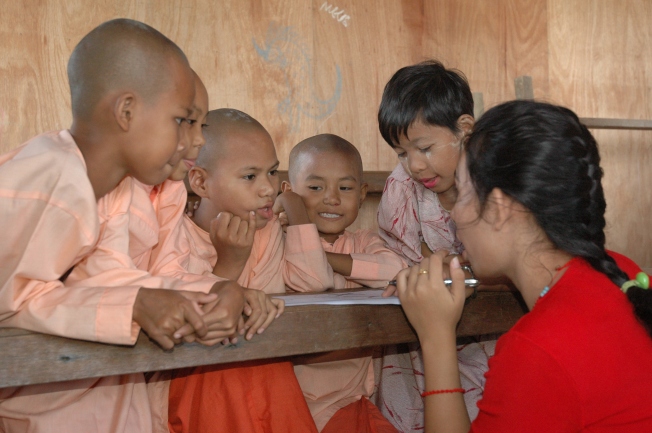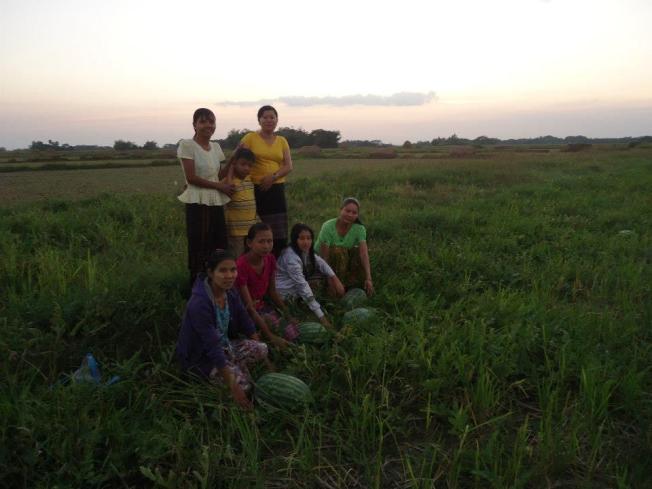In Myanmar (Burma) where I was born and raised up, traditional culture supports gender stereotypes and a belief that education is less crucial for girls than for boys, especially in times of hardship. Subsequently, girls often get less education than boys in their adulthood, resulting in a lack of opportunity for gaining well-paid jobs. Girls are instead required to help with farming and house-keeping. In these days of economic hardship, every household member needs to earn an income, so girls are forced to leave the household to find jobs even though they do not have enough skills. Most urban poor women do not know how to find jobs, how to prepare Curriculum Vitae, or how to set up a business. Job opportunities are very scarce and most industries and factories only recruit the young women who have skills, business knowledge, and good health. These girls with no formal education mostly find work in the industries and factories owned by Chinese businesses and government businessmen. These industries cannot offer enough job opportunities to all the unemployed girls and pay wages that are too low to support a family in Rangoon, which has a high cost of living compared to other cities. Food and housing are particularly expensive in Rangoon. Therefore, some girls who cannot earn enough money living Rangoon become sex workers to earn extra income. Most are not fully aware of health risks associated with sex work or ways to protect themselves from sexually transmitted diseases. An increasing number of women are becoming infected with HIV. These female sex workers are spreading the disease because they lack formal employment, as well as sex education and positive living education. There are also many psychological impacts for the women, such as low morale, depression, anxiety, and suicide because of their status within the society. In the strict Burmese Buddhist society, these women are unvalued and looked down on by the society. Even though their families are struggling to survive, they do not want their daughters to become bar girls or sex workers. Therefore, once girls become sex workers they are no longer accepted by the society and cannot find jobs or opportunities to that would allow them to quit their illegal profession. This means that girls and women who want to quit their professions of sex work cannot survive in the formal economy.
Kyauk Tann Township in suburb Yangon is the population of low socio economic status and community of urban slum people. Many of the young girl students who are attending at the Zabu Oak Shaung free nunnery school (My articles about Zabu Oak Shaung’s education program can be read on A Remarkable Woman Who Made Her Dreams Do Come True.) are facing a thread for the continuation of their education at every new academic year. Their parents cannot guarantee them to be able to complete a highest decent education: high school graduation or a bachelor degree. Like most the welfare children in the downtown and privileged areas of Yangon, they cannot have a chance to enjoy other co-extracurricular and life skills programs such as computer, internet and language trainings.
By providing vocational and personal development training in their summer holiday to a number of potential young girl students from the Zabu Oak Shaung nunnery school and empowering them to develop their business, entrepreneurial mindset and confidence, the selected girls will be trained sewing and personal development skills at the end of the project. “One Step For Girls” is a vocational and personal development training program in summer holidays for economically vulnerablgirls from the Zabu Oak Shaung, initiated and implemented by Metta Moe Myanmar, the local civil society organization I and my friends founded in May 2009.
As the next phase, we will find a potential market for the garments made by the girls and empower them to set up small business at their home or the nunnery school. The girls, their family, the nunnery school and the community are aimed to benefit from those activities and impact. For a sustainability purpose, these girls must also cascade their knowledge and skills to another group of girls at the next summer holiday. Our Metta Moe team, the nunnery school and the girls themselves must find a potential funding source for the marketing, setting up small businesses and future training delivery phases.
The project idea came from the preliminary discussion with the Myaing Tharyar ward (1) community where the nunnery school is situated and the Zabu Oak Shaung. They will contribute five sewing machines, a space, food in training days and other helps in need. Our Metta Moe will contribute Personal Development Training and Sharing Circle facilitators.

The integration of vocational skills and personal development training is a more powerful approach to empowerment rather than just mediocre economic empowering to girls and women. Ma Hnin Si is the one of the most inspiring women I have ever met in my life. At her young age, her husband then passed away with AIDS and she was also diagnosed with HIV. At that time, she was very vulnerable in terms of health, economic and social aspects. Both her family and parents-in-law did not give her a hand. Instead of that, they neglected and discriminated her. She was really in a deep dark ravine. She was even sent to a mental health hospital as an insane person. When she joined our organization’s psychosocial support program two years ago, she was one of the team leaders in her organization. Her leadership and interpersonal skills is far beyond her life and experiences. She was sharing her story as a lesson learning and ideal example to her peers and fellows with a thoughtful and reflective insight. It is remarkable that she is a motivated entrepreneur and business woman throughout her life, both in difficult and trouble-free situations. It is like there is none sort of business she hasn’t done, from small restaurant owner and selling flowers at a pagoda to seasonal agriculture business and making and selling garments and hand-made accessories. She can even support her family who once treated her badly. That makes her feel delight, sense of capability and personal confident. Last year, she got married for second time. She loves her new husband so much and feels like he is everything for her. But after few months, she realized the bitterness from that marriage. She found her husband is a bad guy. He abused her both physically and mentally on a daily basis. He is very uncooperative and seriously criticizes and blames whatever she does. He restricts her rights. He makes shameful things in her social life. He meaninglessly and excessively squanders all the money she makes. Every fruitful and peaceful mechanism of her life broke down since then. She has been in severe depression and cannot think of for her current and future.
Action for Public (My article about Action for Public can be read on Action for Public, Action for Women.) is a women empowerment organization founded by a high-visionary young woman who is also a Fulbright MPA scholar. We, both AFP and MMM, believe that multidisciplinary approach is the most effective empowerment evolution for girls and women in vulnerable circumstances. At AFP, the primary program is vocational training and income generation programs. At the same time, Ma Kyi Pyar, the founder and program-director of AFP, organizes occasionally leadership, personal development, problem solving and life skills training programs for her beautiful women. In summer holidays, language teaching, story telling and other fun and co-extracurricular activities are arranged by the support of partnered organizations for effected and infected children of those women. Ma Kyi Pyar keeps her organization’s atmosphere in a family setting with good discipline rather than a hierarchical NGO structure. By this way, women feel they are very trustworthy, reliable and supportive each other. She also organizes fun activities such as karaoke and going to pagoda and other fun places for women and she is also an active participant in those leisure activities. By this way, her members feel her genuine support and it is also a role model for humble and charismatic leadership. In collaboration with Metta Moe, AFP has been providing psychosocial support training and service program to its women. Now, Ma Hnin Si is in struggling circumstance but thanks to that awesome program, she is having a helpful support for her mental deterioration. Her counselor genuinely listens and shows empathy to her. She challenges and shapes her thoughts. They together find solutions and develop coping mechanism. Ma Hnin Si feels she is now in the right track to recovery.

If I, Ma Kyi Pyar and Daw Wi Mala Sari who is the principal nun of Zabu Oak Shaung are asked, as a grassroots young woman leader, what motivates us and why we are doing what we are doing, our answers will not be different. “We believe that we, women, can do it.” “We believe that Girls effect will change the world.” “Some changes cannot wait the regime or policy change, we must create our future.” “Traditionally untapped potential of our girls and women must be solution-oriented at our time.”



